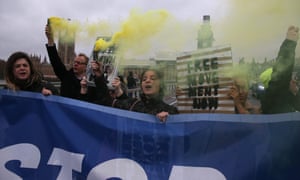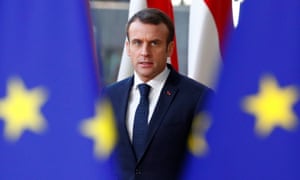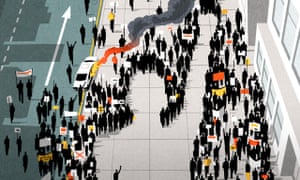Robert, a Romanian law graduate, didn’t come to the UK to undercut wages. But he ended up in insecure low-paid work writes Aditya Chakrabortty in The Guardian

Anti-Brexit protesters in November. ‘The likes of Robert make the easiest human punchbags. You rarely see him or the millions of other EU citizens living in Britain on your TV.’ Photograph: Daniel Leal-Olivas/AFP/Getty Images
Amid all the true-blue backbench blowhards and armchair pundits who will occupy the airwaves this Brexit week, one thing is guaranteed: you won’t hear a word from Robert. Why should you? He commands neither power nor status. He has hardly any money either. And yet he is crucial to this debate, because it is people like him that Brexit Britain wants to shut out.
Robert is a migrant, under a prime minister who keeps trying and failing to impose an arbitrary cap on migrants to this country. Born in Timişoara, Romania, he now lives in a democracy that barely batted an eyelid when Nigel Farage said it was OK to be worried about Romanian neighbours. And Robert gets all the brickbats hurled at foreigners down the ages – that he’s only here to take your jobs and claim your benefits (at one and the same time, mystifyingly), to undercut your wages and give nothing back.
What’s left is a 38-year-old tearing himself apart over his broken life. ‘I’m an idiot,' he says. ‘I’ve wasted myself.'
The likes of Robert make the easiest human punchbags. You rarely see him or the millions of other EU citizens living in Britain on your TV. Nor do you hear about them from a political class forever chuntering on about the will of the people, yet too aloof from the people to know who they are or what they want, and too scared of them to engage in dialogue.
Yet Robert (he’s asked that his surname be withheld) is no caricature. It’s not just how he dotes on his daughter and has a streak of irony thicker than the coffee he serves up. It’s also how his life in Britain proves that those declaimed causes of Brexit are both too easy and too far off the mark. However sad his story, it also shows where our economy really is broken – and how it will not be fixed by kicking out migrants.
We met a few weeks ago at his flat on the outskirts of Newcastle upon Tyne. Too bare to be a home, its sole reminder of his old family life is a little girl’s bedroom, kept in unchildlike order for his daughter’s weekend visits. He and his wife split a few months ago, he says, when the family’s money ran out. What’s left now is a bank account in almost permanent overdraft and a 38-year-old man tearing himself apart over his broken life here. “I’m an idiot,” he says. “I’ve wasted myself.”
But please, spare him the migrant stereotypes. Low-skilled? Robert came to the UK in 2008 with a law degree and speaking three languages. Low aspirations? Even while grafting in restaurants and hotels, he fired off over 100 applications for a solicitor’s training contract. That yielded just one interview, in Leeds. Local firms that were happy to have him volunteer for free proved more reluctant to give him a paying job. He ended up in a part of the country that has spent most of the past 40 years trying to recover from Thatcherism’s devastation, and which is even now paying the price in cuts for the havoc wreaked 10 years ago by bankers largely based hundreds of miles away. In a country where relations between regions are as lopsided as they are between workers and bosses, the odds were stacked against him from the start.
Finally, Robert signed with a temp agency, PMP Recruitment, which in August 2012 placed him with the local Nestlé factory. And that’s where trouble really began.
He had just enrolled in the precarious workforce, which at the last count numbered just over 3.8 million workers across the UK. Never guaranteed work, he had to wait for the offer of shifts to be texted to him a few days beforehand. He did days, nights, whatever was given, and started on the minimum wage in Nestlé’s Fawdon plant – a giant place churning out Toffee Crisps and Rolos and Fruit Pastilles. It was no Willy Wonka-land.
Robert began by “spotting” – standing on a podium overlooking the Blue Riband production line and pulling out imperfect chocolate bars. Seeing the conveyor belt spool along for hours on end made him dizzy, and another recently departed worker tells me he couldn’t bear to do it for long (Nestlé says it has “rotation processes for work that is particularly repetitive”). Stubborn pride made him stick it out for 12-hour shifts. “Leave your head at home,” workmates would advise and, amid the exhaustion of shifts and raising a family, that’s what he did. But bit by bit he noticed things were wrong.
As an agency worker, he says he was doing the same tasks as Nestlé staff, but for less money. They got a pay rise, he alleges, that agency workers didn’t. He would do work classed by the company as “skilled” but instead got “unskilled” rates. His former workmate, who doesn’t wish to be named, tells me this was common practice: “If Nestlé wanted you to come in at an awkward time, they’d say, ‘We can pay you skilled rates’.” Over the years, Robert estimates that he lost out on about £26,000 of income.
Robert was in no man’s land. He was spending his days working for Nestlé but was not their direct employee – even though he gave five years of service at Fawdon. Nor did he have much to do with his recruiters at PMP, a nationwide agency. As for the plant’s trade unions, he saw them as “a waste of space”. He was trapped in an institutional vacuum. The chair of the Law Society’s employment law committee, Max Winthrop, describes such arrangements – working for one company while on the books of another for years on end – as a “fiction”. “The most generous way you can look at it is, it’s a confusing situation. The least generous is that it’s a deliberate attempt to throw sand in everyone’s eyes so we can’t see the true nature of the relationship.” Nestlé says that of its 600 staff at Fawdon, 100 are agency, all via PMP. Over the years, Robert says he saw hundreds of agency staff come and go.
When Robert raised the issue with Nestlé managers, he alleges that shifts were no longer given to him. Finally, just before last Christmas, he resigned. He then tried to get other agency workers to join him in taking Nestlé to court, but they were, he says, “too nervous”. So he launched an employment tribunal case alone and, a few weeks after we met, Nestlé settled out of court. One of the conditions of the settlement is that he cannot discuss it, but Robert knows this article will appear. Citing confidentiality, Nestlé did not want to comment directly on his case but says that, since 2014, all staff in its factories get the living wage, and “we refute any allegation that working conditions at our Fawdon factory are below standard”.
On his PMP payslips Robert also noticed that – as a result of the “recruitment travel scheme” in which the agency had enrolled him – some months he was getting less than minimum wage, a situation for which Winthrop says he “cannot find any justification”. He took PMP to court too, and a couple of months ago was awarded over £2,000 in back pay. PMP wouldn’t comment for this piece, other than to say it is appealing the verdict.
The best way to defeat a crass generalisation is with specifics, and what Robert’s story tells you is it’s not the migrant worker doing the undercutting here. He even tries to get his British-born workmates to join him in a class action for what’s rightfully theirs. The real problem is instead the imbalance of power between the worker and the employer, which is happily maintained by the same politicians today who claim they want to help the “left behind”.
PMP and the 18,000 or so other employment agencies in Britain are overseen by a government inspectorate of just 11 staff. The director of labour market enforcement in the UK, David Metcalf, admits that a UK employer is likely to be inspected by his team only once every 500 years. Were I an unscrupulous boss, I would take one look at those numbers and ask myself: if I do my worst, what’s the worst that can happen?
What keeps Robert here now is those weekends with his daughter. But after 10 years in Britain he’s learned something else too, about the reality of a country that claims to welcome foreigners, even as they punish them. An economy that promises a better life to those it then sucks dry. A society that kids itself that it’s a soft touch when really, it is as cold and hard as any interminable overnight shift.



